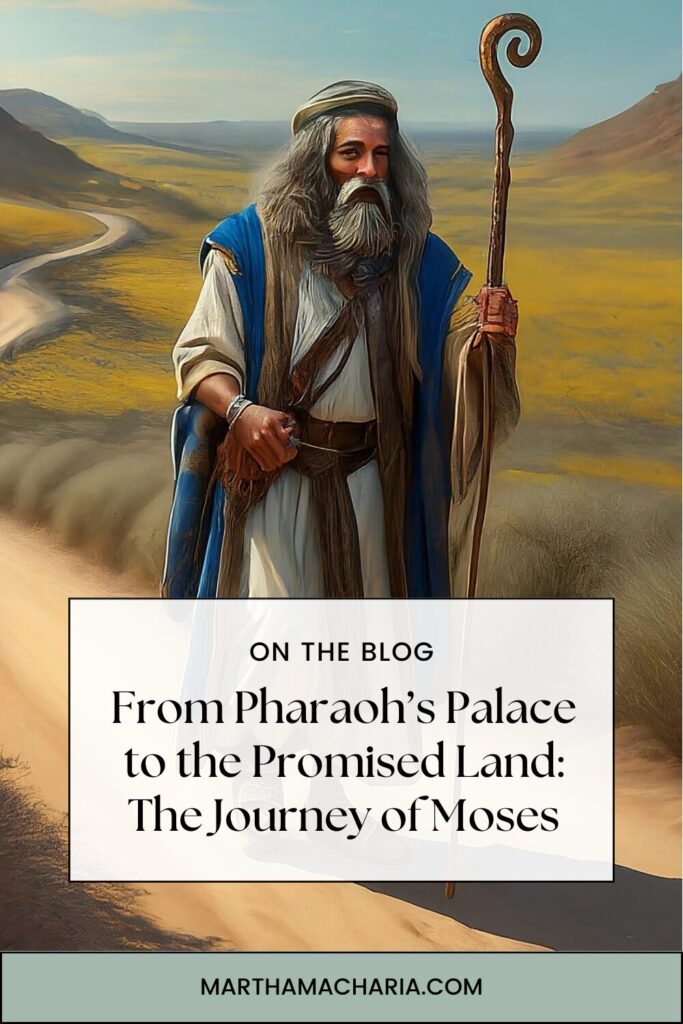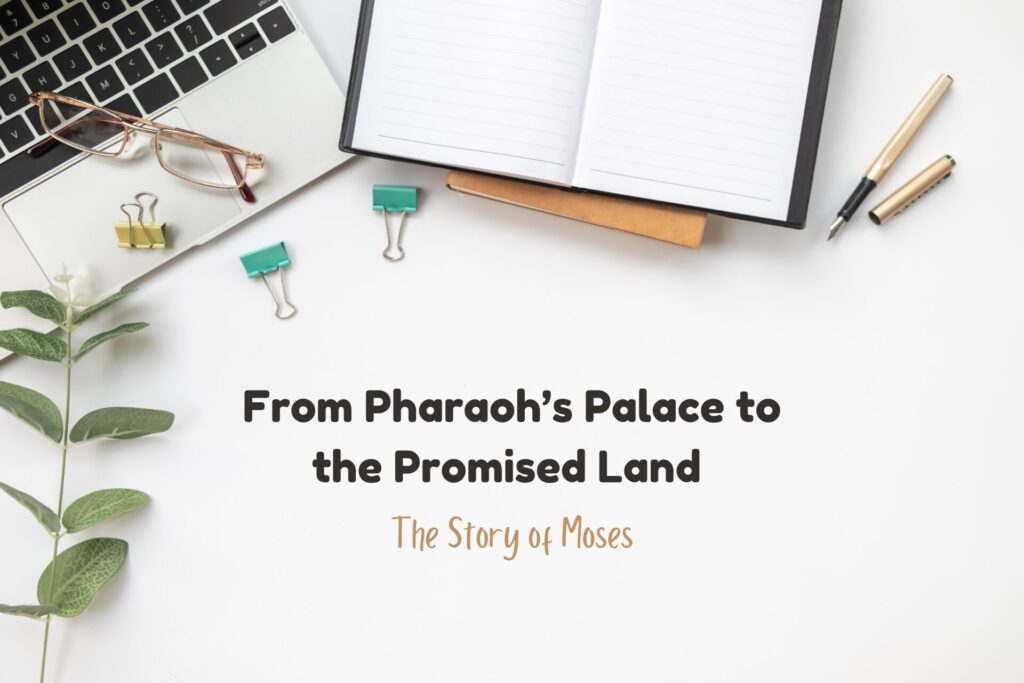One of the most riveting stories in the Bible worth diving into is—the story of Moses, from the opulence of Pharaoh’s palace to the rugged terrain of the Promised Land. This tale is not just a historical account; it’s a powerful reminder of God’s unwavering faithfulness and His ability to transform our lives, no matter where we start.
From Egyptian Royalty to Hebrew Shepherd
Picture this: a baby boy, born into a family of Hebrew slaves, is saved from certain death by the courageous acts of his mother. The Hebrews were not always slaves. Their journey of slavery has its roots in the Story of Jacob, the father of Joseph.
The story of Moses begins in a rather dramatic fashion. The Pharaoh of Egypt, fearing the growing number of Hebrews, had decreed that all male Hebrew infants should be killed. He first summoned the Hebrew midwives, Shiphrah and Puah, and directed them to kill any son born to Hebrew women. The midwives feared God, therefore they did not carry on with Pharaoh’s wishes. Because of the failure of his plan, Pharaoh told his people to throw the Hebrew male children into the Nile River.
But Moses’ mother, Jochebed, wasn’t ready to let her baby go so easily. She placed him in a basket among the reeds by the riverbank, trusting God with her son’s future. I cannot imagine how difficult it must have been.
His sister stood at a distance, I imagine scared for her baby brother, but curious to see what would happen. What she saw next was undoubtedly a breath holding experience. The daughter of Pharaoh had gone to bathe at the river, and she spotted the basket. She sent one of her young women to bring the basket to her. When she opened it, she saw a baby boy crying. She immediately recognized that he was a Hebrew boy, but instead of throwing him in the Nile, she pitied him. She took him and brought him up as her own.
Imagine the irony—Moses goes from being a potential victim of Pharaoh’s decree to being raised in the very household of Pharaoh! It’s as if God had a plan all along, using Moses’ circumstances to prepare him for something much greater.
The Burning Bush and the Call to Leadership
Fast forward a few years, well, like forty years, we find Moses in a somewhat less glamorous position—he’s now a shepherd in Midian. Ok, this is what happened. One day, as he walking around, he saw an Egyptian beating one of his people. By now, he knew his remarkable story. He struck down the Egyptian and killed him. When he later found out that his action, which he thought he had done secretly, was known, he ran away. And so, he ended up in Midian.
He met a lady, married her and God blessed them with children. One day, while tending his sheep, Moses encountered something extraordinary: a burning bush that’s was not consumed by the flames. He went near it to investigate. God spoke to Moses from this bush, calling him to lead the Israelites out of slavery in Egypt.
Moses, understandably, was hesitant. He questioned his own abilities and wondered how he could possibly convince Pharaoh to let his people go. But God assured him, “I will be with you” (Exodus 3:12). This promise is pivotal, reminding us that when God calls us to do something, He doesn’t leave us to figure it out on our own.
Plagues, Passover, and the Exodus
Moses returned to Egypt with his brother Aaron and confronted Pharaoh, demanding the release of the Israelites. What followed are ten dramatic plagues, each demonstrating God’s power and judgment against Egypt’s gods. The final plague, the death of the firstborn, is particularly poignant. The Israelites were instructed to mark their doorposts with lamb’s blood, and the angel of death would pass over their homes. This event became the foundation of the Passover festival, a reminder of God’s protection and deliverance.
After the final plague, Pharaoh relented, and the Israelites began their journey out of Egypt. But Pharaoh’s change of heart was short-lived, and he pursued them. This led to one of the most iconic moments in the Bible: the crossing of the Red Sea. The Israelites found themselves trapped between the sea and Pharaoh’s army. In a miraculous act of divine intervention, God parted the waters, allowing the Israelites to walk through on dry ground. Once they were safely across, the waters returned, engulfing the Egyptian army. The Israelites are finally free!
Wandering in the Wilderness
You’d think that with such a dramatic escape, the journey to the Promised Land would be smooth sailing, right? Ah, not quite. The Israelites spent the next 40 years wandering in the desert, a period marked by trials, complaints, and moments of doubt. Moses had to consistently seek God’s guidance and intercede on behalf of the people, despite their frequent grumbling and rebellion.
During this time, God provided for the Israelites in miraculous ways—sending manna from heaven, providing quail after they complained, water from rocks, and guiding them with a pillar of cloud by day and a pillar of fire by night. This period was not just about the destination but also about the journey and the lessons learned along the way. It’s a testament to God’s provision and faithfulness, even when the path is long and challenging.
The Promised Land
After 40 years of wandering, the Israelites are finally poised to enter the Promised Land. But there’s a twist: Moses, who had led them through so much, was not allowed to enter the land himself. You may wonder why he died in the wilderness. Well, he struck a rock two times and God had told him to speak to the rock. However, he was able to view it from Mount Nebo before passing the leadership baton to Joshua.
Moses’ story concludes with a moment of reflection and blessing. He reminded the Israelites of God’s faithfulness and urged them to remain true to the covenant they had made with Him. Despite not entering the Promised Land himself, Moses’ legacy lives on through the people he had led and the laws he had imparted.
What Can We Learn from Moses’ Journey?
God’s Timing and Plans: Moses’ story shows us that God’s plans are often bigger than we can see or imagine. From the palace to the wilderness, each stage of Moses’ life was part of God’s grand design. When things seem uncertain or delayed, we can trust that God is working all things together for good (Romans 8:28).
Leadership and Obedience: Moses’ leadership is a powerful example of faith and obedience. He wasn’t perfect, but he was willing to follow God’s call, even when it was daunting. This is a reminder that God uses ordinary people to accomplish extraordinary things.
God’s Provision: The way God provided for the Israelites in the desert reminds us that He will always take care of our needs. Whether through miraculous provisions or everyday blessings, we can trust that God will not leave us in the wilderness.
Perseverance: The Israelites’ journey was long and fraught with challenges, but they ultimately reached their destination. Similarly, our spiritual journey may have its ups and downs, but with perseverance and faith, we can trust that God will lead us to where we need to be.
So, next time you face a challenge or wonder about your own journey, remember Moses and the Israelites. Their story is a powerful reminder that God is with us every step of the way, guiding us, no matter how winding the road may be.
Reflection
- In what areas of your life do you feel like you’re in a “wilderness” season, and how can you trust God’s provision and guidance during this time?
- Moses showed incredible faith and obedience despite his doubts and fears. How can you cultivate a similar trust in God when facing difficult decisions or challenges in your own life?
- What does Moses’ story teach you about the concept of waiting on God’s timing? How can you apply this understanding to a current situation where you’re waiting for something to come to fruition?


